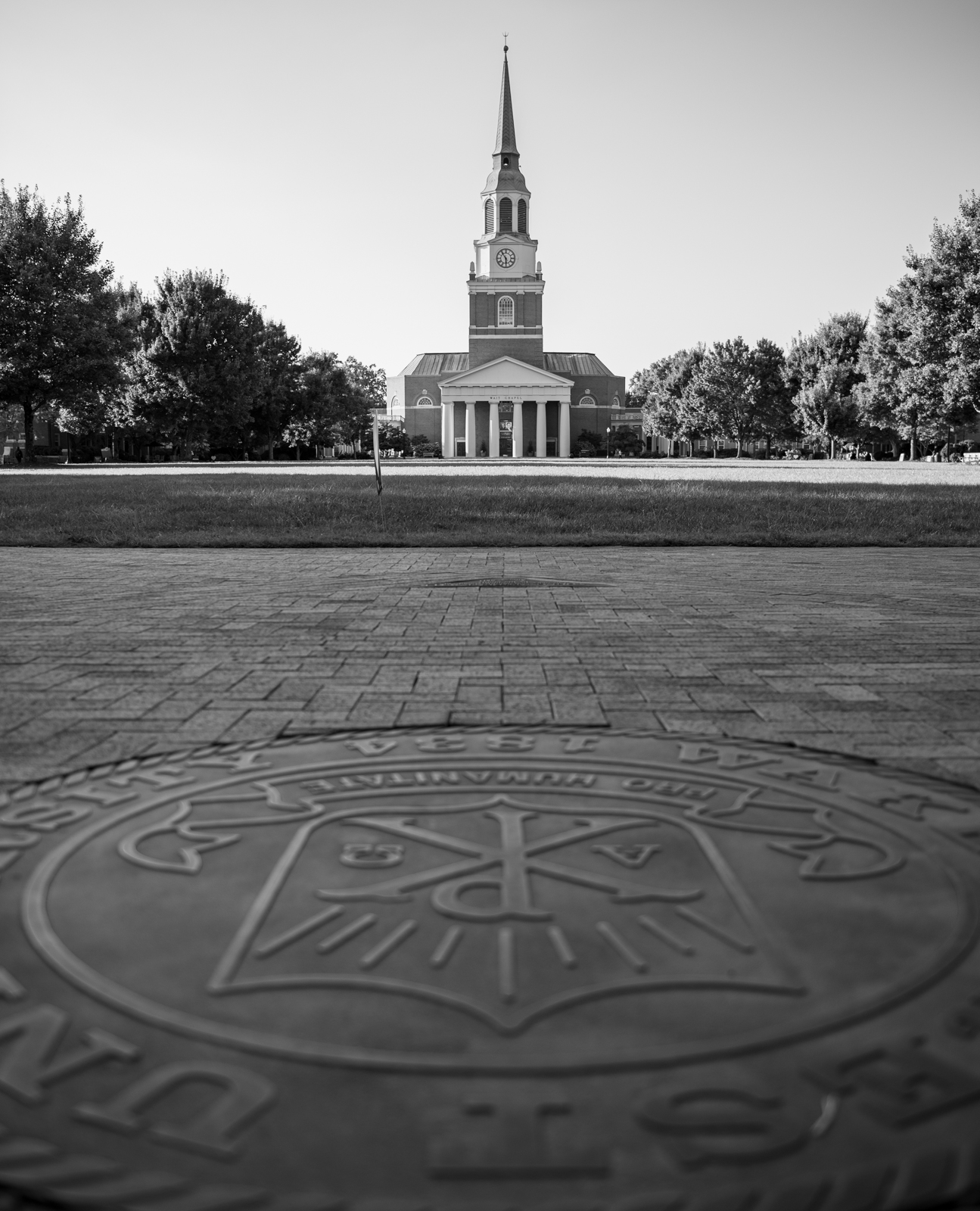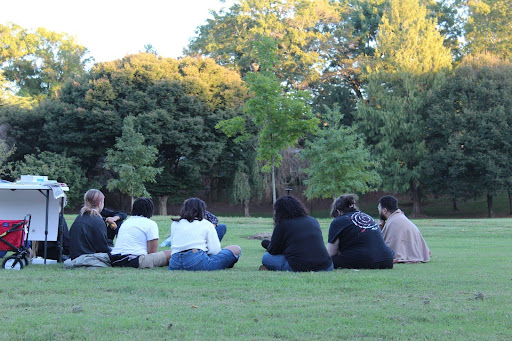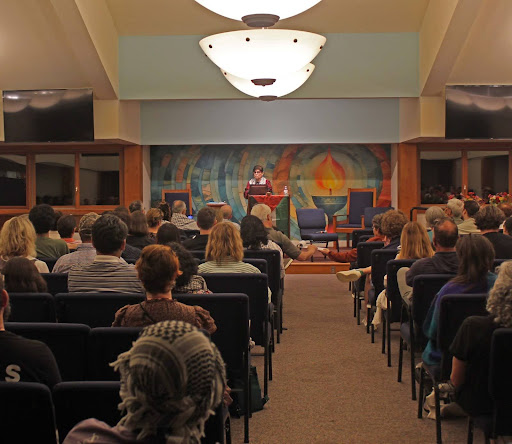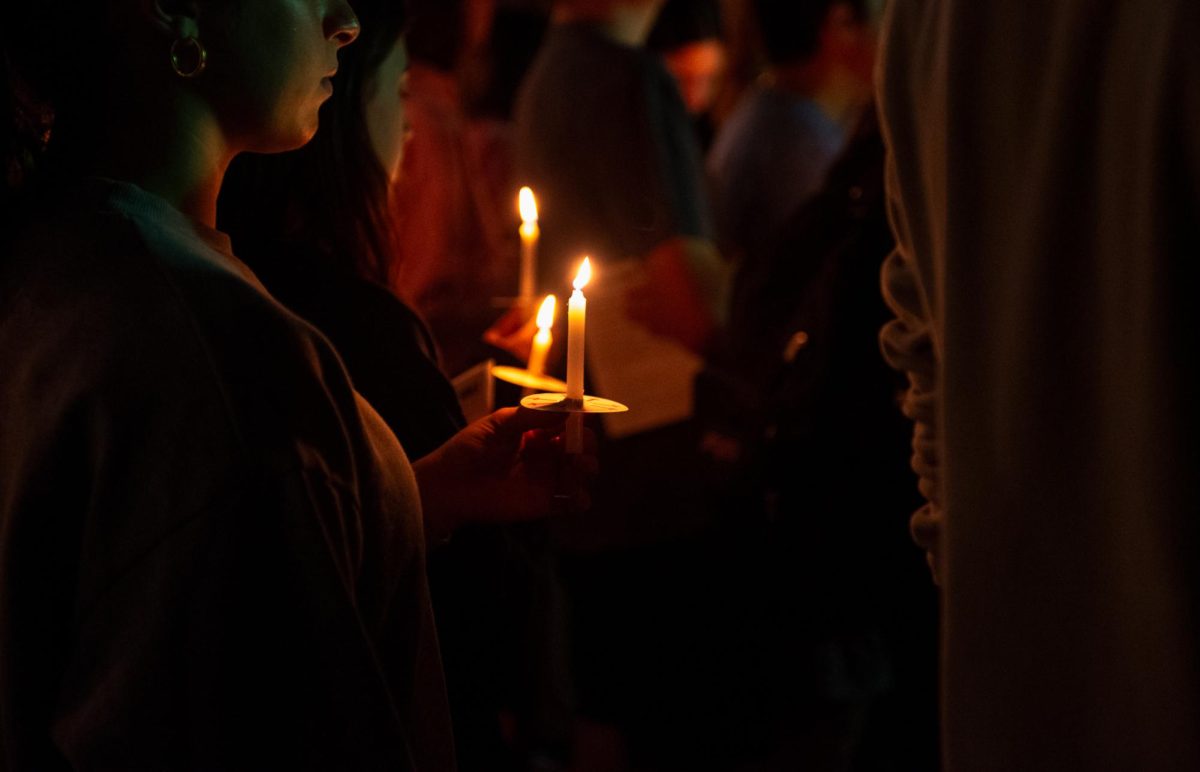Update Oct. 31, 2023: Laura Mullen informed the Old Gold & Black on Tuesday, Oct. 31, that she has resigned from her position. Students in her poetry workshop say that she will continue to teach her Fall 2023 courses. Read the Old Gold & Black’s story on Mullen’s resignation here.
—
A Wake Forest humanities professor is facing intense criticism and threats to her personal safety after a now-deleted post to her X (formerly Twitter) account regarding the Israel-Hamas War circulated among the Wake Forest community and beyond.
The post, which Kenan Chair of the Humanities Laura Mullen published on her personal X account on Oct. 12, reads: “So it’s kind of a Duh but if you turn me out of my house plow my olive grove and confine what’s left of my family to the small impoverished state you run as an open air prison I could be tempted to shoot up your dance party yeah even knowing you will scorch the earth.”
The post has stirred up an intense response on Mullen’s personal X account, which has since been made private, and on Wake Forest parent Facebook groups and has sparked multiple letters to Provost Dr. Michele Gillespie and President Dr. Susan Wente. Mullen says that she has received threats and has met with the provost’s office to take steps to ensure her physical safety, including a police presence at a poetry reading she hosted on Thursday, Oct. 19.
Mullen said the post came from her training as a poet, which calls her to imagine the pain and suffering of others, especially in times of crisis.
“The imagination that went into the post is the imagination that I felt like the world…was not at that moment holding,” Mullen said. “I still would say, overwhelmingly, it seems like we could use more of that imagination.”
The post is a condensed interpretation of a long, complicated history. First, it refers to the Nakba, in which Palestinians were displaced and dispossessed en masse during the 1948 Arab-Israeli War. The post also refers to the blockade of Gaza, which Israel and Egypt have imposed for the past 16 years. The post then refers to an attack earlier this month on an Israeli music festival by Hamas, a Palestinian militant group, that killed 260 people (attacks elsewhere in Israel killed about 1,200 more people). Finally, the post refers to Israel’s response to Hamas’ attack, which at time of this article’s publication has claimed about 6,000 Palestinian lives. (Editor’s Note: The Old Gold & Black follows AP Style guidance, which is to refer to Hamas as a militant group.)
Mullen said that the post was not meant to condone the militant group’s actions in any way but rather to understand how the violence could come about in the first place.
“What concerns me the most in the reaction to the post is the confusion between the attempt to understand human beings and ‘the condoning of violence,’” Mullen said. “The post did not condone violence.”
Dr. Barry Trachtenberg, the Michael H. and Deborah K. Rubin Presidential Chair of Jewish History, said he believed the tone of the post was too flippant, but that he read the post as explaining, rather than justifying, the violence perpetrated by Hamas on Oct. 7.
“The explosions that happen when people are placed in pressure cookers are always painful and horrible, but they’re also preventable,” Trachtenberg said. “And this is my reading of Professor Mullen’s post.”
Senior Hasan Pyarali said that he thought the post contained important context relating to Hamas’ attacks but that the post as written seemed to justify the attack, as well. Pyarali also said that the posts missed the point of the broader argument of Palestinian liberation, which is to condemn violence against civilians.
“X is not the best place to have an intelligent discourse on politics,” Pyarali said. “It’s usually for quick takes and inflammatory takes, as I think this post was. I don’t think the post was the most helpful way to have gone about this. What I do believe is that there’s quite a bit of context that this professor was trying to bring attention to — and granted, she might not have done it in the best way — and describe how this event didn’t really happen in a vacuum.”
Mullen took the post down in the early morning of Oct. 19.
“When I was unable to sleep, and I was looking at what was going on, on my personal Twitter account, I took the post down,” Mullen said. “I just looked at it and thought the people who are interacting with this are not good people. It’s time to stop.”
Mullen faces threats to her safety
Mullen has faced threats to her physical safety — threats which she says have only intensified since Oct. 17, when Wente and Gillespie released a statement saying that they “do not condone or support” the views expressed in Mullen’s post. Mullen said the content of the statement was not shared with her ahead of time.
“I have received things that were more angry and violent through my [author contact] portal since the university posted its statement,” Mullen said.
In an email to the Old Gold & Black, Gillespie explained the decision to release a statement.
“We prefer to connect directly with individuals to address their concerns whenever possible, but in cases where interest in hearing from Wake Forest leadership extends beyond faculty, staff and students, it is advantageous to have a single statement to which we can refer people,” Gillespie told the Old Gold & Black by email.
The threats against Mullen come as some students, especially Muslim students, have said that they are afraid to speak out about the conflict for fear of being harassed, blacklisted or doxxed. Blacklisting, in general, refers to being excluded, usually from opportunities such as jobs or graduate schools. To dox means to publish someone’s personal, identifiable information, such as an address, usually on the internet.
Pyarali said that he and other Muslim students have felt unsafe due to the threats levied against Mullen. He said he found calls to blacklist students who speak out or sign petitions in support of Palestine “very damaging.”
“To be in that ecosystem and that giant power imbalance can be really scary,” Pyarali said, “And I think that’s what a lot of Muslim students on this campus feel.”
“No student should have to fear for their safety:” Campus reacts to post
Many Wake Forest students and alumni interpreted the post as a direct endorsement of Hamas’ violence against Israeli citizens.
In a statement to the Old Gold & Black, the student board of Wake Forest’s Chabad chapter said that Mullen’s posts made Jewish students feel less safe on campus. Chabad is a Jewish movement that includes numerous synagogues and college chapters globally.
“The members of the Chabad Student Board wholly condemn the statements by Professor Laura Mullen,” the statement reads. “As Jewish students, we are alarmed and appalled that she is willing to make a joke of the massacre at the Supernova Music Festival that killed over 250 Israeli civilians. Any of us could have been one of those attendees, and many of us have relatives and friends who are in danger or have been killed in Israel in recent weeks.”
The statement, available in full here, continues: “Students and parents alike have expressed concern for their safety in reaction to her hateful words. No student should have to fear for their safety or feel uncomfortable while sitting in class, but as she is a professor in a position of authority and influence, Jewish students now feel scared to take her classes. Her threatening language plays into anti-Semitic sentiment, a problem that poses a threat to Wake Forest students and that has no place at our school.”
Wake Forest alumna Rachel Severance wrote a letter to Wente, which she also sent to the Old Gold & Black as a letter to the editor, calling on the university to reconsider Mullen’s faculty position for this reason.
“How can any Jewish or Israeli student feel safe in her classroom?” Severance wrote. “She is not inviting dialogue or encouraging learning and understanding. She is justifying a horrific terrorist attack that resulted in the brutal rape and murder of innocent human beings.”
Mullen said that her intent was not to hurt anyone with her post. She told the Old Gold & Black that she hopes anyone who was hurt by her comments will reach out to her to have a dialogue. Mullen also said that she has not directly heard from students about her post.
“I don’t like hurting people,” Mullen said. “And I’m not here to hurt people.”
Senior Andie Barnes said that they also read the post as condoning Hamas’ attacks and called the post “not only highly inappropriate, but also unprofessional.”
“I understand that she wanted to display her support for Palestine, but endorsing the acts of Hamas is not the way to do this,” Barnes told the Old Gold & Black by email. “You can support Palestine and the liberation of Palestinians while also condemning the acts of Hamas. The two are not mutually exclusive.”
Barnes said the post made them feel unsafe as a student who supports Palestinian liberation.
“I feel that Professor Mullen’s posts, as well as Wake’s response to these posts, have affected the safety of those who support the Palestinian liberation by making it seem like those who support Palestine and condemn Israel also support Hamas, which is not true,” Barnes said.
Gillespie said any students who are feeling unsafe — for any reason — should contact the university’s support line (336) 758-CARE (2273).
“Physical and psychological safety are necessary for meaningful teaching and learning to take place,” Gillespie told the Old Gold & Black via email. “We are aware that some students, particularly Jewish and Muslim students, are feeling that their psychological safety has been threatened.”
According to Mullen, there has been positive feedback from some parents, and a student, who left an unsigned letter for her. The letter, which Mullen shared with the Old Gold & Black, is from a Jewish student.
“You face the difficult position of being judged by those you do not speak on behalf of,” the letter reads. “You’re not advocating for the privileged, so I understand why your message might not be getting the best reception here [at Wake Forest.] I, though, and countless other Wake Forest students are thankful for your steadfast and well-expressed defense of the Palestinian people.”
On Oct. 15, Mullen published a follow-up post, in which she says “Huzzah to everyone who wants me silenced for expressing an understanding of the fact that despair leads to violence. A human truth. A ‘duh.’ Facts are neither changed or erased by those writers who notice and report.” Mullen tagged the non-profit, pro-free speech organization PEN America in her post.
The university’s response
In their statement, in addition to saying that they do not “condone or support the views expressed in these posts,” Wente and Gillespie argued freedom of speech and academic freedom were integral to “the mission of higher education and the tradition of constructive and civil discourse and debate at Wake Forest.”
Many Wake Forest community members have expressed dissatisfaction with the university’s statement and overall response. Their reasons for being dissatisfied differ.
Wake Forest alumna Samanatha Wexler and her father, who is also an alum, wrote Wente a note as well expressing their disappointment in the university’s statement, resource page and lack of support for students overall.
“The lack of response from Wake Forest on the Hamas terrorist attack and resulting issues on campus have created a less safe environment both intellectually and physically for Jewish students,” Samantha Wexler wrote. “It is the opposite of the Pro Humanitate culture that I expect from Wake.”
Severance, who was vice president of Hillel as a student, said the university did not adequately condemn Mullen or Hamas and that she will no longer be supporting the university financially.
“All my effort will now be directed toward supporting the students of Wake Forest University Hillel … and ensuring everyone is aware of Wake Forest’s failure to create a safe environment conducive to leaving the world better than we found it,” Severance wrote in her letter to Wente.
On the other hand, some believe the university’s statement has adversely affected those who support the Palestinian cause and those who are Muslim.
Michael H. and Deborah K. Rubin Presidential Chair of Jewish History
Trachtenberg, for example, said he was disappointed by the university’s statement because it sent the message that professors would pay a professional price for acknowledging Palestinian suffering.
Trachtenberg also said the university missed an opportunity to de-escalate the conversation and provide context to Mullen’s post.
“Rather than issue a statement that condemns Prof. Mullen’s post and inappropriately appears to accuse her of condoning violence, the administration could have addressed the flippant tone of the comment but then gone on to explain the much larger — and entirely legitimate — argument that she is making,” Trachtenberg said.
Barnes also thought the university’s statement fell short. In their view, Mullen’s post condoned violence, and in so doing, has “the potential to impact the lives of Muslim students and influence the lives of thousands of other Wake students by making it seem as though the actions of Hamas were justifiable.” Barnes said the university should recognize that professors need to present the facts of the situation and not condone violence.
“A professor should not be teaching that Hamas’s actions were right,” Barnes told the Old Gold & Black via email. “In the future, Wake Forest needs to be aware that as an institution, it has a duty to educate.”
The university’s statement, as well as other resources on the Israel-Hamas War, are available at outreach.wfu.edu.
Claire O’Brien, Maddie Stopyra and Christa Dutton contributed reporting to this article.
Have a news tip or feedback on our reporting? Email wfuogb@gmail.com.
The Old Gold & Black will continue to report on the Israel-Hamas War.
Update Oct. 24: The narration before Andie Barnes’ quote about student safety has been updated to better reflect Barnes’ sentiments.
Update Oct. 25: This story has been updated to include the perspective of senior Hasan Pyarali.
Update Nov. 1: This story has been updated to reflect that the Old Gold & Black has confirmed the author of the unsigned letter to Mullen.






















Philip Corey • Oct 29, 2023 at 4:15 am
The fact that Jewish students were afraid to take her class is absurd !!afraid of what ? What did they imagine would happen to them if they did take her class ! These kids are so thinned skinned & over protected why don’t they just debate their views instead of cowering ?
Anonymous • Oct 31, 2023 at 11:53 am
When someone says that they could be “tempted to shoot” someone that has a similar identity to you, it is more than acceptable to feel afraid to be in the same room as that person. I don’t know about you and your mental capacity, but for me I could not be near or taught by someone who I know wants to shoot me for my Jewish identity and has a history of threatening gun violence. Prioritizing one’s safety and not wanting to be taught by an antisemitic and bigoted professor is not “cowering” and being “thin skinned.” Any threat of gun violence, especially on a college campus, is not something the University or anyone should address lightly. Your minimizing of Laura Mullen’s clear antisemitic rhetoric and violence is disappointing and disgusting.
Mr. Don • Nov 6, 2023 at 2:53 pm
“Your minimizing of Laura Mullen’s clear antisemitic rhetoric and violence is disappointing and disgusting” Exactly
Mr. Don • Nov 6, 2023 at 2:52 pm
You’re out of your mind.
anonymous • Oct 27, 2023 at 12:22 pm
The U.S. State Department designated Hamas a terrorist group in 1997.
The fact that an American institution is trying to not call it a terrorist organization is reprehensible
Anonymous • Oct 24, 2023 at 10:35 pm
Laura Mullen is an embarrassment to both Wake Forest and the William R. Kenan, Jr. Charitable Trust. She is a horrible example of a human being and should be unaffiliated with both organizations in order to salvage the dignity of her peers. As a creative writing professor, she should understand the power of words. What makes matters worse is that Ms Mullen never apologized for her statements and the hurt she caused. She finally took the post down because “the people who are interacting with this are not good people.” Wow! Another insult and judgement on the people she offended. Anyone who objected to her insensitive and vile post “are not good people”. I’m sensing a trend here.
It is unfortunate that her statement of “temptation” to murder was handled by the administration at Wake as a freedom of speech incident rather than an inquiry into the mental stability of a faculty member. However, it’s not too late to right the ship and prove that Pro Humanitate is truly a core principle and not just a catch phrase.
Anonymous • Oct 24, 2023 at 8:31 pm
It is insane to me that the university issued a statement on Mullen’s post but not Omaar Hena’s genitalia
Anonymous • Oct 25, 2023 at 9:18 am
Another “freedom of speech”?
Anonymous • Nov 1, 2023 at 8:13 am
And that he has not been fired (or has not resigned) too.